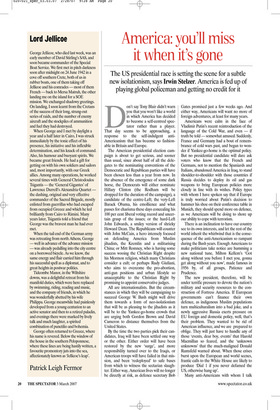Lord Jellicoe
George Jellicoe, who died last week, was an early member of David Stirling’s SAS, and soon became commander of the Special Boat Service. We first met in pitch darkness soon after midnight on 24 June 1942 in a cove off southern Crete, both of us in rubber boats, one of them taking off Jellicoe and his comrades — most of them French — back to Mersa Matruh, the other landing me on the island for a SOE mission. We exchanged shadowy greetings. On landing, I soon learnt from the Cretans of the success of their long, strung-out series of raids, and the number of enemy aircraft and the stockpiles of ammunition and fuel they had destroyed.
When George and I met by daylight a year and a half later in Cairo, I was struck immediately by the tonic effect of his presence, his initiative and his inflexible determination, and his knack of command. Also, his humour and buoyant spirits. We became great friends. He had a gift for getting on with his own soldiers and sailors and, most importantly, with our Greek allies. Among many operations, he worked several times with General Christodoulos Tsigantis — the ‘General Gigantes’ of Lawrence Durrell’s Alexandria Quartet the dashing, original and very effective commander of the Sacred Brigade, mostly enlisted from guerrillas who had escaped from occupied Greece and which he led brilliantly from Cairo to Rimini. Many years later, Tsigantis told a friend that George was the bravest man he had ever met.
When the tail end of the German army was retreating from north Athens, George — well in advance of the advance mission — was already pedalling into the city centre on a borrowed bicycle. As we know, the same energy and flair carried him through his successful spell as a diplomat, and to great heights in postwar politics.
Tidcombe Manor, in the Wiltshire downs, was a delightful retreat from his manifold duties, which were here replaced by swimming, riding, reading and music, and the company of friends, in which he was wonderfully abetted by his wife Philippa. George meanwhile had painlessly developed from a young centurion to an active senator and then to a retired paladin, and evenings there were marked by lively talk and much laughter, a spirited combination of punctilio and bohemia.
George often returned to Greece, where his name is revered. Below the window of the house in the southern Peloponnese, where these lines are being hastily written, a favourite promontory juts into the sea, affectionately known as ‘Jellicoe’s leap’.
Patrick Leigh Fermor










































































 Previous page
Previous page